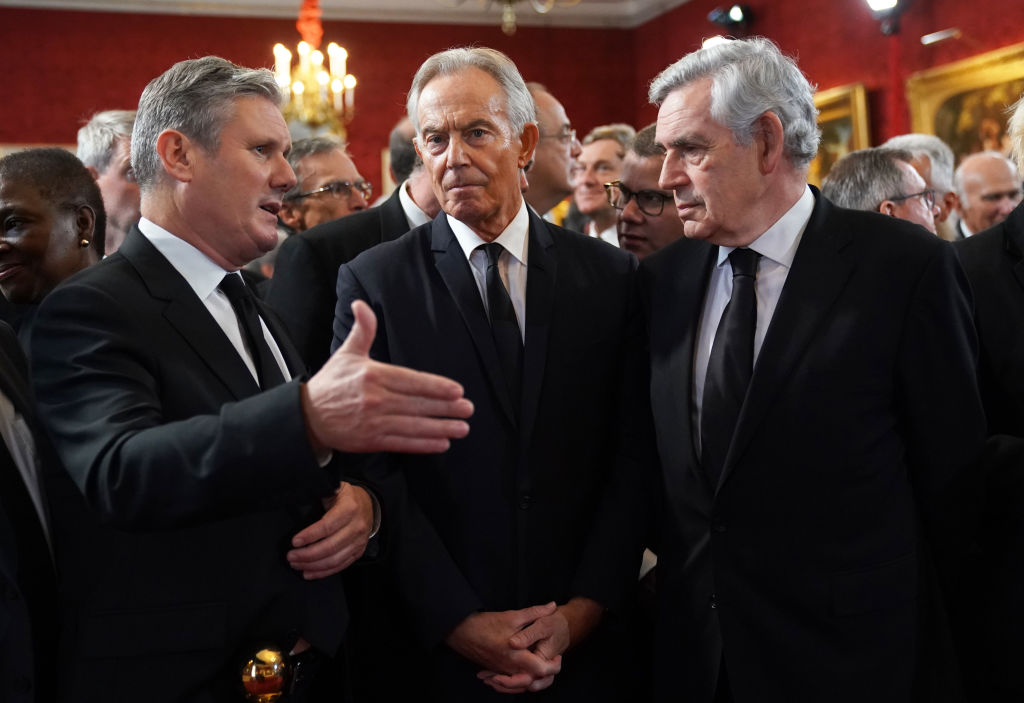During his successful 2020 leadership campaign Keir Starmer claimed he was his own man, saying, ‘I can think for myself, I don’t need to hug Jeremy Corbyn, I don’t need to hug Tony Blair or anybody else to make a decision.’ Having kicked Corbyn out of the parliamentary Labour party, Starmer is unlikely to seek or indeed receive many hugs from his immediate predecessor. Starmer has, however, increasingly and pretty blatantly sought to evoke comparisons between himself and Blair, the last Labour leader to win a general election. Recently Starmer even shared a platform with Blair at the latter’s Foundation for Global Change’s ‘Future of Britain’ conference, dubbed ‘Blairstock’ by wits. There are sound reasons for all this – but the Labour leader should be cautious of being enveloped by the undoubtedly warm and welcoming Blairite embrace.
Many of Blair’s achievements in government were superficial and easily swept away after 2010
Blair led his party to three general election victories and served as prime minister for longer than any other Labour leader. He had notable achievements in Downing Street, in particular reducing child and pensioner poverty and improving levels of performance across the public sector, especially in the NHS. It would be ridiculous for Starmer, who lacks ministerial experience along with most of his shadow cabinet, to turn a deaf ear to any practical insights Blair might offer.
Even so, Blair was effectively forced to step down as leader in 2007 by a party which had grown disappointed in him. The 2005 election, Blair’s third victory in a row, saw Labour win just 35.2 per cent of the vote, the smallest of any majority government in British electoral history, also indicating the way the public was wearing of him. In the month he resigned Blair had a satisfaction rating of -27 per cent. And it is certainly arguable that if any one person was responsible for the election of Corbyn as Labour leader in 2015 it was Blair. Perhaps inevitably, as Enoch Powell famously noted, all political careers end in failure, but Blair’s most definitely did. It is therefore more useful for Starmer, if he truly wants to transform Britain, to focus on the reasons Blair failed – rather than Blair’s transient successes.
Looking back on Blair’s premiership, it appears more as an opportunity lost rather than a period of serious and lasting achievement. His two landside victories of 1997 and 2001, and the confusion that gripped the Conservatives as to how best to respond to them, along with an ever-growing economy, gave Blair – had he wished to exploit it – the political and financial space to change Britain. But he did not wish to exploit that space. Instead, he adhered to the basic Thatcherite orthodoxy which stipulates the market’s superiority over the state apart from in exceptional circumstances, even as many in his party were champing at the bit for change.
Blair was also afraid of losing his grip on Middle England voters, who determined the party’s fate in innumerable constituency contests in the South. This reinforced his strategic restraint, which then added fuel to the simmering discontent in what were then called Labour’s ‘Heartlands’, to be later rebadged the ‘Red Wall’. Blair felt he could overlook demands for more collectivist measures to radically address inequality in former industrial communities, believing Labour’s traditional working-class supporters had nowhere else to go. As a result, many of Blair’s achievements in government were superficial and easily swept away after 2010.
There are some – notably Blair himself – who still believe that during his time as Labour leader he marked out the One True Path for the party. His approach certainly worked in the short-term for Labour and Britain. But Blair’s myopic electoral strategy and unqualified faith in the globalised free market ultimately had disastrous consequences, which any Starmer government will need to fix.
Blair left Downing Street nearly two decades ago, before the financial crash, austerity, Brexit, Covid and the Ukraine war. When he was in charge the unions were cowed, inflation and taxes were low and the economy growing. The context for Blair’s success has been changed in so many ways, and few of them good. It consequently seems odd that commentators still talk about Blair as a relevant contemporary actor, especially given the dark cloud of Iraq hanging over him. Harold Wilson did not consult Clement Attlee in 1964 about how he should conduct his government; nor was Jim Callaghan called on by Blair in 1997 as any kind of mentor. Perhaps Starmer might be best advised to take the same approach to Blair today.
The current Labour leader’s truly ambitious Five Missions for a Better Britain suggests he has a very un-Blairite desire to leave a permanent and decisive mark. Just now, however, the caution that defined Blair’s whole approach is echoed by Starmer’s current watering down of potentially transformative party policies. There is clearly a tension within Starmerism between caution and radicalism.
If he wishes to avoid Blair’s fate as a Labour prime minister of modest and temporary achievement – bookended by two prolonged periods of Conservative governments – he should beware that Blairite hug.






Comments